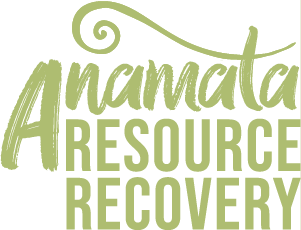Living Lightly Featuring Julie Bowers-Rakatau
Introducing Julie, she resides in Okupu and owns Claris Store. Julie is a creative, committed and thoughtful consumer and shopper, especially when she is stocking her shelves.
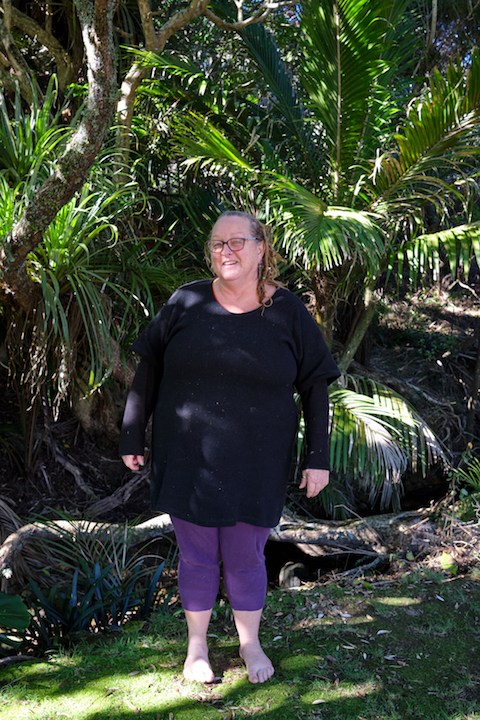
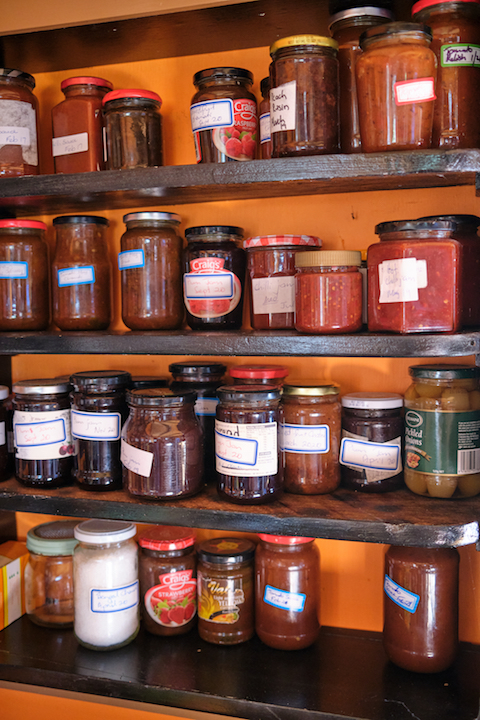
How long have you lived on Aotea?
34 years
Are you originally from the island? If not, how did you end up here?
I am not originally from the island but we came to visit a friend who lived in Okupu. I knew it was home when we got off the ferry and my feet hit the ground. I was facing raising kids in the city and out here we could grow, have the beach at our doorstep and more ‘easy’ living. I moved over with four kids three months after the first visit.
When and how did your zero / minimum waste journey begin?
When we moved to the island, I was digging in the yard to start a garden. I got about six inches down and found a plastic bread bag intact. I thought ‘this doesn’t make sense’. I’m now cleaning this bag and taking it to the Tip. I thought about the waste cycle and it was an eye-opening moment. Even here? That got me thinking and kicked off small changes – like eliminating plastic wrap, aluminum foil, etc. and the rest developed step by step.
Tell us about some of the things you do that help to reduce waste, resource consumption, and sustainable living.
Well, I have always had a garden, so that allows and encourages us to eat seasonally and waste free. But in the beginning I had kids and no money, so this was the only way. Now, it’s more of a choice. We also save our seeds year over year, which aids in sustainable garden practices.
We have 7 worm farms! We feed our meat scraps to the eels in our creek (they are huge and hungry), we burn our bones, and put excess dairy back into the garden.
We’ve never really had a rubbish bin at home. We have a cardboard box that we use to collect all non-organic materials for the two people in our household. We continuously sort it and about every 3-6 months we could fill a wheelie bin.
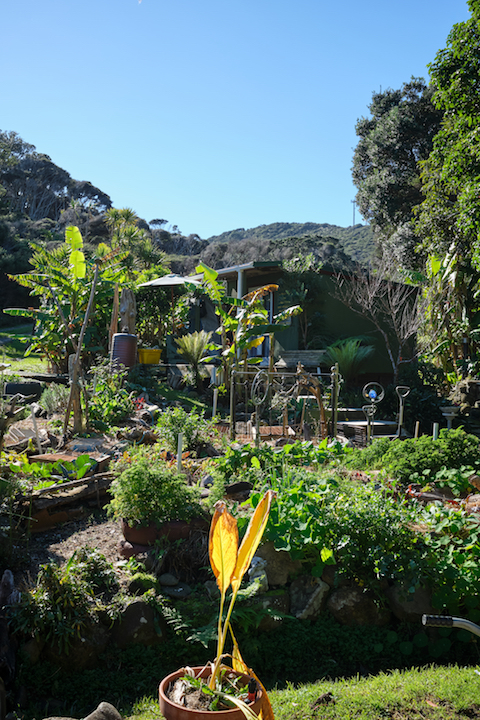
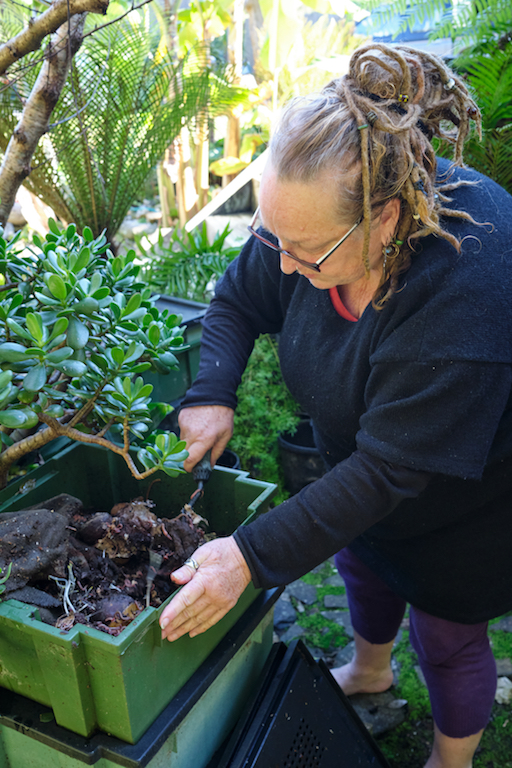
What motivates you about this lifestyle? Why is this important for you, your family and your home – specifically?
It’s a simpler lifestyle. I have never been one for material things, so this minimal waste lifestyle is really in line with my values. I love to reuse, reuse, reuse.
I also really like to know and understand my food, waste, compost, etc. I really think about the cycle of all things I am putting back into the ecosystem. Whether it be about medication or antibiotics going into the water or garden, soaps we use, the food chain in general, the waste cycle overall.
Food waste is a large contributor to our wastecycle island and country-wide. What is your policy / best practice to minimize food waste?
I bought the Claris Store in 2000. Having the shop allowed me to really understand the issue of packaging, cardboard recycling and reuse, the cycle of waste in our food system.
Packaging is hard. Hard to avoid, hard to get rid of, hard to reuse. So I think it’s just better to avoid it. Use bulk bins and buy loose produce. One huge issue is with meat. It all comes in plastic and styrofoam packaging and it’s hard to buy in bulk. Plus, a lot of people don’t have a proper fridge or freezer, so they are shopping more regularly and therefore having to buy more things in packaging.
Having the shop has really allowed me to understand the sheer miles on food. It’s really bothersome and not well understood or thought about. We need to be really thoughtful in this arena and try to keep it as local as possible.
We don’t offer any plastic bags at the shop, but we do use the Boomerang bag system or only brown paper bags if necessary. And now we have a soft plastics collection point at the shop which is great! So when you come to do your shopping, bring your previous packaging back to be recycled.
What are some of your best min waste / up-cycling tips?
Eat seasonally. Don’t buy fruit and veg packaged where possible and reuse as much as possible.
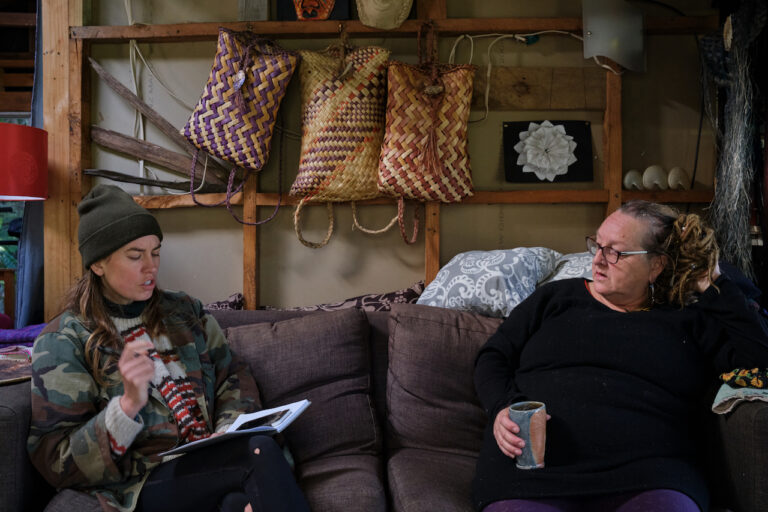
What are you most excited for in regards to the future of min waste on the island?
The soft plastics recycling. It just makes sense and soft plastics are such a large part of our waste cycle, it’s great that they can now be recycled and remade into our Future Fence posts. I think it’s a fantastic initiative.
How do you see the influx of people moving here/visiting? How do we get them up to speed?
We need easy, quick access to our min waste efforts. It needs to be readily available and visual. We need to explain our mission and help them engage and participate with us.
How can people start to incorporate zero / min waste attitudes and habits into their daily life?
Stop – think – live differently. Just overall, try and simplify your life. Think about the where, what, who and whys of it all. You don’t want to make your life any harder, so choose simplicity. Keep it minimal.
What do you hope to see on Aotea over the next 5-10 years?
I’d love to see an Okupu central community compost up and running. We need that here.
I’d also like to see a change in the milk containers used. There is so much milk purchased on the island and they are a big source of plastic waste. It would be great to see a return to a recycling or glass milk bottle scheme.
Overall, it would be the ultimate goal to not be shipping our rubbish off island. If we could get to a stage where 85% of our waste was recycled or reused, and what’s left over we can keep. A real goal and achievement of zero/minimum waste for Aotea.


How long have you lived on Aotea?
34 years
Are you originally from the island? If not, how did you end up here?
I am not originally from the island but we came to visit a friend who lived in Okupu. I knew it was home when we got off the ferry and my feet hit the ground. I was facing raising kids in the city and out here we could grow, have the beach at our doorstep and more ‘easy’ living. I moved over with four kids three months after the first visit.
When and how did your zero / minimum waste journey begin?
When we moved to the island, I was digging in the yard to start a garden. I got about six inches down and found a plastic bread bag intact. I thought ‘this doesn’t make sense’. I’m now cleaning this bag and taking it to the Tip. I thought about the waste cycle and it was an eye-opening moment. Even here? That got me thinking and kicked off small changes – like eliminating plastic wrap, aluminum foil, etc. and the rest developed step by step.
Tell us about some of the things you do that help to reduce waste, resource consumption, and sustainable living.
Well, I have always had a garden, so that allows and encourages us to eat seasonally and waste free. But in the beginning I had kids and no money, so this was the only way. Now, it’s more of a choice. We also save our seeds year over year, which aids in sustainable garden practices.
We have 7 worm farms! We feed our meat scraps to the eels in our creek (they are huge and hungry), we burn our bones, and put excess dairy back into the garden.
We’ve never really had a rubbish bin at home. We have a cardboard box that we use to collect all non-organic materials for the two people in our household. We continuously sort it and about every 3-6 months we could fill a wheelie bin.
What motivates you about this lifestyle? Why is this important for you, your family and your home – specifically?
It’s a simpler lifestyle. I have never been one for material things, so this minimal waste lifestyle is really in line with my values. I love to reuse, reuse, reuse.
I also really like to know and understand my food, waste, compost, etc. I really think about the cycle of all things I am putting back into the ecosystem. Whether it be about medication or antibiotics going into the water or garden, soaps we use, the food chain in general, the waste cycle overall.
Food waste is a large contributor to our wastecycle island and country-wide. What is your policy / best practice to minimize food waste?
I bought the Claris Store in 2000. Having the shop allowed me to really understand the issue of packaging, cardboard recycling and reuse, the cycle of waste in our food system.
Packaging is hard. Hard to avoid, hard to get rid of, hard to reuse. So I think it’s just better to avoid it. Use bulk bins and buy loose produce. One huge issue is with meat. It all comes in plastic and styrofoam packaging and it’s hard to buy in bulk. Plus, a lot of people don’t have a proper fridge or freezer, so they are shopping more regularly and therefore having to buy more things in packaging.
Having the shop has really allowed me to understand the sheer miles on food. It’s really bothersome and not well understood or thought about. We need to be really thoughtful in this arena and try to keep it as local as possible.
We don’t offer any plastic bags at the shop, but we do use the Boomerang bag system or only brown paper bags if necessary. And now we have a soft plastics collection point at the shop which is great! So when you come to do your shopping, bring your previous packaging back to be recycled.
What are some of your best min waste / up-cycling tips?
Eat seasonally. Don’t buy fruit and veg packaged where possible and reuse as much as possible.



What are you most excited for in regards to the future of min waste on the island?
The soft plastics recycling. It just makes sense and soft plastics are such a large part of our waste cycle, it’s great that they can now be recycled and remade into our Future Fence posts. I think it’s a fantastic initiative.
How do you see the influx of people moving here/visiting? How do we get them up to speed?
We need easy, quick access to our min waste efforts. It needs to be readily available and visual. We need to explain our mission and help them engage and participate with us.
How can people start to incorporate zero / min waste attitudes and habits into their daily life?
Stop – think – live differently. Just overall, try and simplify your life. Think about the where, what, who and whys of it all. You don’t want to make your life any harder, so choose simplicity. Keep it minimal.
What do you hope to see on Aotea over the next 5-10 years?
I’d love to see an Okupu central community compost up and running. We need that here.
I’d also like to see a change in the milk containers used. There is so much milk purchased on the island and they are a big source of plastic waste. It would be great to see a return to a recycling or glass milk bottle scheme.
Overall, it would be the ultimate goal to not be shipping our rubbish off island. If we could get to a stage where 85% of our waste was recycled or reused, and what’s left over we can keep. A real goal and achievement of zero/minimum waste for Aotea.

